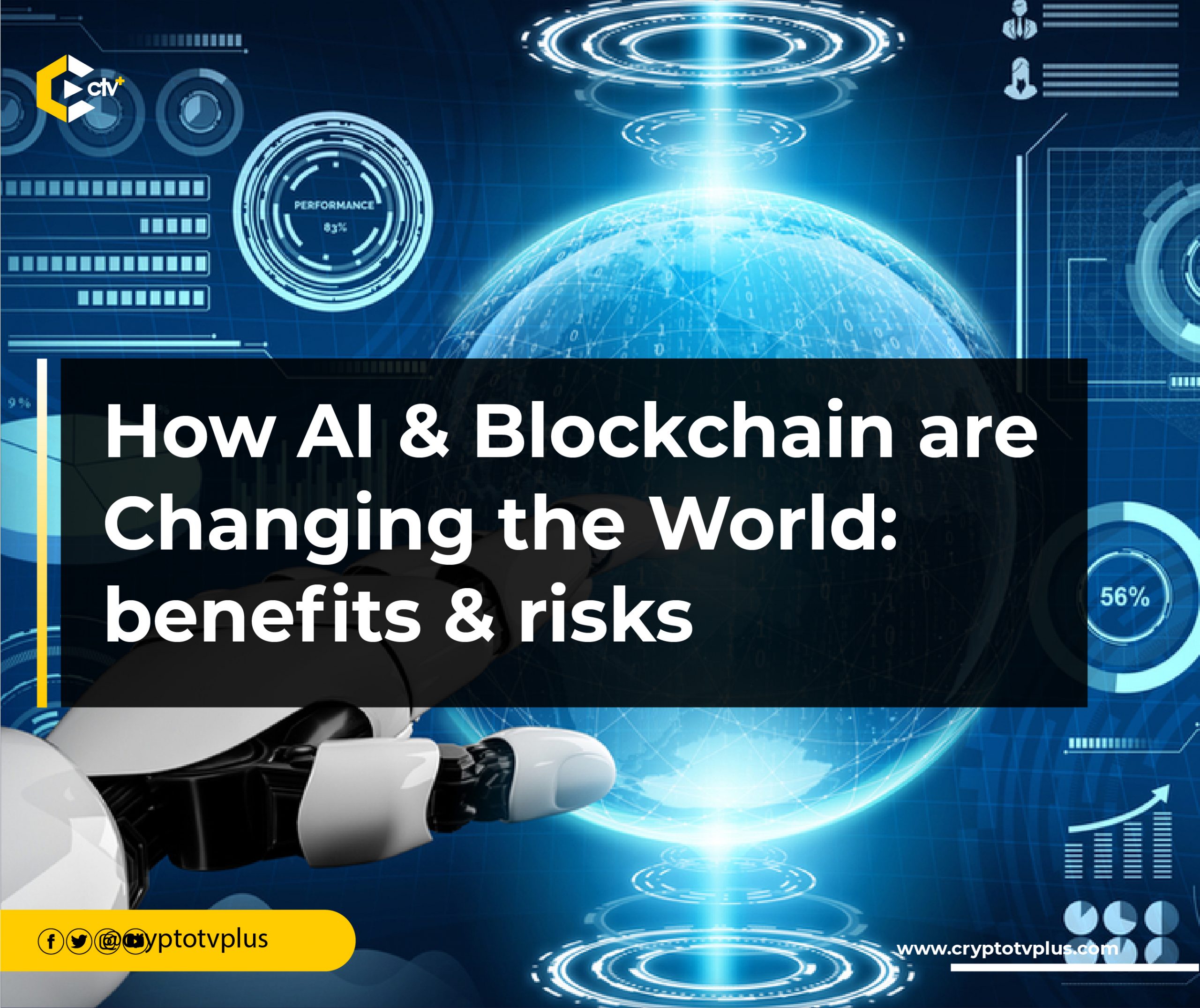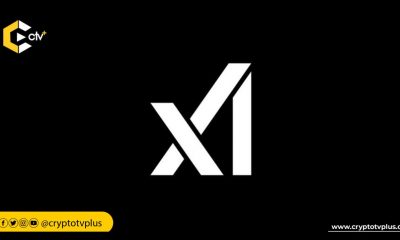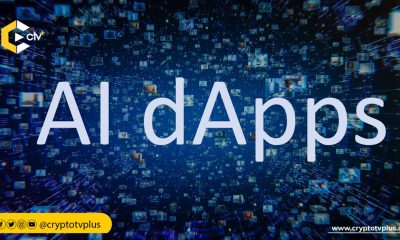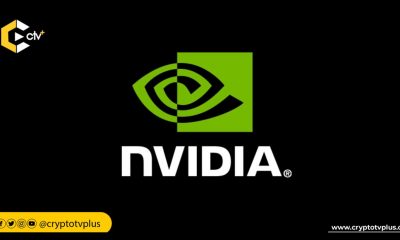Education
How AI & Blockchain are Changing the World: benefits & risks

The rapid advancement of technology is driving a remarkable transformation in the world. Two of the most significant advancements are Artificial Intelligence (AI) and Blockchain. These groundbreaking technologies are game-changers, with enormous capacity to transform almost every aspect of human life. AI has already made significant strides in mimicking human intelligence, cutting costs while improving efficiency.
The explosive growth witnessed by OpenAI’s ChatGPT is a testament to the potential of AI and its importance in our world. In turn, blockchain technology offers a decentralized and unchanging ledger, making sharing data more secure and resistant to manipulation.
The convergence of AI and Blockchain has the potential to transform industries like finance, healthcare, and logistics. Advanced algorithms and machine learning could significantly improve security measures while underlying distributed ledger systems provided via blockchain technology can ensure data remains immutable.
However, while the benefits of combining AI and Blockchain are vast, there are also risks. This article delves deeper into this powerful combination, exploring both the benefits and risks associated with their amalgamation, including their potential to revolutionize industries and their adoption concerns.
AI: Transforming Industries and Enhancing Efficiency
Maximizing efficiency and productivity through automation
Industries are witnessing an AI-powered revolution, one that enhances productivity by streamlining business processes. For instance, by utilizing AI-powered robots that perform repetitive tasks with utmost precision, manufacturing industries have managed to advance their production output and reduce errors.
Big names in the industry like Tesla are reshaping the future by embracing such tech-driven automation to optimize their production line resulting in revolutionary improvements in production timelines.
Another example is Hewlett Packard (HPE), which offers AI-enabled, scalable, efficient, and cloud-based solutions for data analysis. They utilize advanced technologies such as simulation, sensor fusion, and deep learning to develop intelligent autonomous vehicles.
Enhanced Decision Making and Predictive Analytics
Through the use of AI technology, businesses can make informed decisions at lightning-fast speeds. With access to limitless data, Machine Learning algorithms can identify trends, recognize patterns, and offer reliable insights. In the healthcare industry, AI-powered systems are being implemented to analyze vast amounts of medical records, genetic data, and even research papers.
With this new technology, doctors can personalize treatment plans and predict outcomes with greater accuracy. The California-based firm Viz.ai is an example. The Healthtech company uses AI to detect issues and rapidly alert care teams. This leads to quick treatment decisions and saves lives in the healthcare industry.
Ultimately, AI-driven healthcare systems lead to improved patient care and better overall outcomes. BioXcel Therapeutics is using AI to change the game in immuno-oncology and neuroscience. They’re developing new medicines, identifying new patients, and discovering fresh applications for existing drugs through their drug re-innovation program.
Personalized User Experiences
The benefits of using AI algorithms are vast. For instance, online platforms like Netflix and Amazon are able to offer personalized experiences to their users by leveraging AI to analyze user behavior and preferences.
This means that recommendations for movies or products are tailored to the individual user based on their browsing history, resulting in higher satisfaction and engagement. Another example of AI in action is Facebook, which uses machine learning to suggest relevant content to its users.
Buoy Health is a chatbot that uses AI technology to provide personalized diagnoses and treatment options to patients based on their symptoms and health concerns. These AI features help increase sales, deepen user retention and engagement, and foster loyalty between firms and their users.
Blockchain: Securing Data and Revolutionizing Trust
Immutable and Transparent Records
Blockchain technology is a force for transparency and decentralization. By eliminating the need for intermediaries, it promotes trust and integrity while preventing fraud and counterfeiting. In supply chain management, Blockchain tracks goods from their source to their ultimate destination, ensuring accountability and transparency at every point.
For instance, EverLedger, a UK-based blockchain startup, offers a secure digital record of a product’s origin, characteristics, and ownership, along with fraud and risk detection assistance. Similarly, IBM Blockchain helps supply chain partners share reliable data through authorized blockchain solutions.
Utilizing smart contracts provides real-time visibility and improves the ability to take timely actions. The reliability and permanence of blockchain-based transactions also enhance accountability and traceability in finance, providing an indisputable trail of money transfers.
In 2021, the El Salvadoran President announced the adoption of Bitcoin as a legal tender. This meant there would be open records of transactions involving BTC that can be easily trailed, thus saving time if a dispute arises. In governance, blockchain ensures openness and transparency by allowing constituents to observe ongoing processes.
This eliminates the opacity and backroom dealings of the past. In Feb 2023, a proposal to deploy Uniswap v3 on BNB Chain was voted on. With a total of over 84 million votes, 55.88m voted to pass the proposal while 28.47m voted against with 450k abstaining.
Enhanced Security and Privacy
Blockchain’s decentralized architecture and cryptographic algorithms make it one of the most secure technologies available today. Removing the risk of a single point of failure greatly reduces vulnerabilities and enhances the security of sensitive data.
Healthcare systems could benefit greatly from this technology, using Blockchain to encrypt and share patient records, ensuring unparalleled privacy and security.
Efficient Digital Transactions
Blockchain technology is revolutionizing the way transactions are recorded. By eliminating the need for intermediaries such as banks or payment processors, the blockchain provides an immutable and secure record of transactions that ensures transparency for all parties involved.
Many cryptocurrencies, including Bitcoin and Ethereum, utilize blockchain technology to enable peer-to-peer transfers with near-instant settlement times, offering lower fees compared to traditional systems.
Cryptocurrency also has the potential to increase access to finance worldwide, especially for underserved communities that may face regulatory limitations or geographic barriers. This opens up new opportunities for individuals to participate in the global economy and access financial services that were previously unavailable to them.
Convergence of AI and Blockchain: A Powerful Synergy
Data Integrity and Trust in AI
The convergence of AI and blockchain technology has enormous potential to ensure the dependability, authenticity, and veracity of data-centric insights across varying industries. Through blockchain’s secure and distributed ledger system, bad actors cannot tamper with records in any way, creating a transparent system.
Combining AI-enabled algorithms and smart contracts can enable parties to reach an agreement on predetermined terms before any transaction ever takes place—eliminating the need for middlemen like banks. For instance, AI-driven credit score assessments can utilize trustless networks facilitated through blockchain to authenticate transactions without any intermediary involvement.
This helps ease the risks posed by deceitful lending practices, as loan applications undergo thorough scrutiny based solely on validated historical records stored immutably within the vast network of distributed ledgers. In April 2023, TransUnion announced a collaboration with Spring Labs and Quadrata to improve credit scoring through the use of blockchain technology.
The goal is to offer lenders innovative credit solutions based on customer data found on the blockchain. TransUnion is now able to supply credit information to DApps upon a customer’s request. Spring Labs’ technology provides the credit score, while Quadrata guarantees smooth data synchronization across the blockchain.
Preserving Privacy with Machine Learning
Artificial intelligence often requires massive amounts of data to train machine learning models. This has raised privacy concerns, mainly when sensitive personal information is involved.
There are emerging techniques like Federated Learning that enable AI algorithms to be trained on decentralized datasets without exposing confidential or sensitive information. Federated Learning allows for collaborative training across multiple devices while keeping users’ raw data stored locally with strong encryption.
This results in individual user behavior remaining private and secure while enabling an accurate model update through a collective process. Another method, Homomorphic Encryption, enables computations over encrypted data by converting plaintext into ciphertext before processing it.
This ensures maximum security, even under adversarial conditions where hackers may attempt to access data via intermediaries such as cloud service providers. Lastly, Blockchain technology is also being used to maintain confidentiality by allowing parties with no trust relationship among themselves to share control over their datasets securely.
This includes end-to-end transparency and traceability, along every transactional step from input-output mapping up until completion/recording at the final stage output directory location.
Decentralized Autonomous Organizations (DAOs)
Blockchain technology has sparked interest in decentralized autonomous organizations (DAOs), which aim to establish democratic and inclusive governance structures.
By eliminating centralized decision-making, DAOs leverage automated processes and transparent rules encoded in smart contracts to determine how funds are allocated.
Despite the potential of DAOs, they can still face challenges in decision-making given the diversity of opinions within the organization. To surmount this challenge, AI algorithms can be integrated into DAO operations to automate computation-heavy tasks and reduce biases that could influence outcomes.
This significantly speeds up critical processes while enhancing data-driven insights, empowering community members with greater information power.
Risks and Challenges
Ethical Concerns
AI-powered systems have the potential to transform the world, but we must be cautious of ethical concerns around privacy, bias, and accountability. Facial recognition algorithms have specifically had to face this challenge, causing backlash over racial and gender bias.
The 2018 MIT and Stanford University study revealed that facial recognition algorithms were less successful in recognizing darker-skinned individuals and women, demonstrating that AI systems can perpetuate and amplify pre-existing prejudices. Developing and implementing ethical AI is essential to avoid unjust practices and safeguard individual liberties.
Security Vulnerabilities & Scams
There’s no disputing that Blockchain has a reputation for being secure, but it’s not a bulletproof solution. There are still risks to consider such as smart contract bugs and possible 51% attacks on specific Blockchain networks. AI systems, on the other hand, can also be susceptible to adversarial attacks that could corrupt the AI’s decision-making capabilities. Crypto scams and hacks pose a significant threat. With billions of dollars lost annually to malicious actors, the merging of these two influential technologies can potentially create new avenues for wrongdoers to exploit market or industry participants.
Regulatory and Legal Challenges
As AI and blockchain technologies become more integrated, new challenges arise, with regulatory compliance taking the forefront. One of the most pressing issues involves data ownership, which must be carefully determined throughout the complete data lifecycle. Intellectual property rights can also be an area of contention, requiring a delicate balance between developers and owners of technology solutions. In Feb, The US Copyright Office asserts that AI-generated images are ineligible for copyright protection. This rule applies to works created by DALL-E, Midjourney, and other similar platforms. Intriguingly, when using Midjourney, users do not retain ownership rights to their creations due to the platform’s Terms of Service. Additionally, free users are prohibited from utilizing their work for commercial purposes. While paid members’ work remains public, they can employ their creations for commercial purposes. In addition, security risks from cybercriminals targeting weak access controls are another concern, requiring consistent cybersecurity protocols across all devices and interfaces.
Addressing these challenges will require responsible use cases and governance frameworks, including permissioned ledger networks and harmonized regulations, to help navigate the complexities of a rapidly emerging digital marketplace.
Conclusion
The fusion of AI and blockchain technology opens a new frontier of opportunities for businesses. Industries spanning healthcare, finance, and more can reap the benefits of AI’s ability to automate tasks and offer valuable data insights. Simultaneously, blockchain’s secure storage options can safeguard users’ sensitive information. Nonetheless, there are risks to contemplate when utilizing these technologies in tandem. The ethics of machine learning algorithms and the necessity for cybersecurity measures must be addressed before pursuing integration. Through a cautious and deliberate approach, entrepreneurs can harness the power of the AI-blockchain synergy in fostering more inclusive and prosperous societies. With appropriate safeguards in place, the advantages of these technologies can be unleashed for the betterment of all.
Read also;
Avalanche unveils AI-powered blockchain, Coin Operated Agents
Do better, train AI to be better than humans – Snowden advises
























